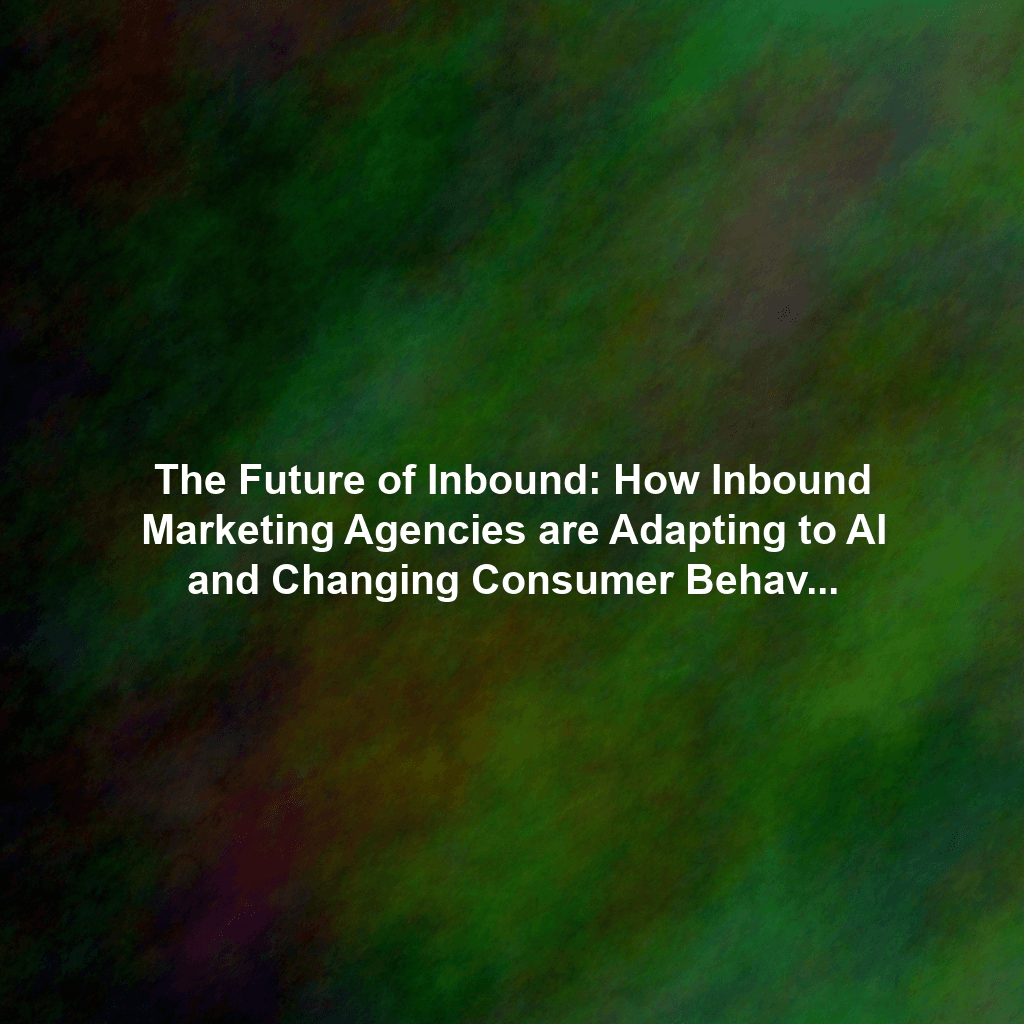The AI Revolution in Inbound Marketing
AI isn’t just a buzzword; it’s a powerful tool reshaping how inbound marketing agencies operate. It’s transforming everything from content creation to customer relationship management, allowing for greater efficiency and more impactful results. Let’s dive into the specifics:
AI-Powered Content Personalization
Generic content is no longer enough. Consumers expect experiences tailored to their individual needs and interests. AI enables hyper-personalization by analyzing vast amounts of data to understand audience preferences, purchase history, and online behavior. Agencies are now using AI to:
- Dynamically adjust website content: Showing different headlines, images, and calls-to-action based on user profiles.
- Personalize email marketing: Crafting email sequences that resonate with individual subscribers based on their engagement levels.
- Recommend relevant content: Suggesting blog posts, articles, or product pages that align with a user’s demonstrated interests.
Automation for Efficiency and Scale
Marketing automation has been around for a while, but AI is taking it to the next level. AI-powered automation can handle repetitive tasks, freeing up marketers to focus on strategic initiatives and creative work. Key applications include:
- Lead scoring and qualification: AI algorithms can identify high-potential leads based on their interactions with marketing materials, allowing sales teams to prioritize their efforts.
- Chatbot implementation: AI-powered chatbots provide instant customer support, answer frequently asked questions, and guide users through the sales funnel.
- Social media management: AI can analyze social media trends, schedule posts for optimal engagement, and even generate content ideas.
Data Analysis and Predictive Insights
Data is the lifeblood of inbound marketing. AI excels at processing massive datasets to identify patterns, predict future trends, and measure the effectiveness of marketing campaigns. Inbound agencies use AI for:
- Predictive analytics: Forecasting future customer behavior, identifying potential churn, and optimizing marketing spend.
- Sentiment analysis: Monitoring social media conversations to understand brand perception and identify potential PR crises.
- Attribution modeling: Determining which marketing channels are most effective at driving conversions and ROI.
Adapting to Changing Consumer Behavior
AI is only half the equation. Understanding and adapting to evolving consumer behavior is equally crucial. Today’s consumers are more informed, demanding, and digitally savvy than ever before. They expect seamless, personalized experiences across all touchpoints. Here’s how inbound agencies are adjusting their strategies:
Prioritizing Authenticity and Transparency
Consumers are increasingly skeptical of traditional marketing tactics. They crave authenticity and transparency. Agencies are responding by:
- Focusing on storytelling: Creating compelling narratives that connect with audiences on an emotional level.
- Building trust through transparency: Being open and honest about their products, services, and business practices.
- Encouraging user-generated content: Leveraging customer reviews, testimonials, and social media posts to build credibility.
Embracing Omnichannel Marketing
Consumers interact with brands across multiple channels – website, social media, email, mobile apps, and more. Inbound agencies are adopting an omnichannel approach to provide a consistent and seamless experience across all touchpoints:
- Integrating marketing channels: Ensuring that all channels work together to deliver a cohesive brand message.
- Optimizing for mobile: Recognizing that mobile is often the first point of contact for consumers.
- Providing personalized experiences across channels: Tailoring content and offers based on user behavior and preferences.
Leveraging Emerging Technologies
Beyond AI, other emerging technologies are also impacting inbound marketing. These include:
- Voice search optimization: Optimizing content for voice search queries.
- Video marketing: Creating engaging video content to capture attention and drive conversions.
- Augmented reality (AR) and Virtual Reality (VR): Exploring immersive experiences to enhance brand engagement.
The Inbound Agency of the Future
The inbound marketing agency of the future will be a data-driven, technologically advanced, and customer-centric organization. It will be able to leverage AI to personalize experiences, automate processes, and gain deep insights into consumer behavior. It will also be adept at adapting to emerging technologies and delivering authentic, omnichannel experiences that build trust and drive results.
Conclusion
The future of inbound marketing is bright, but it requires a willingness to embrace change. Inbound marketing agencies that can effectively leverage AI and adapt to evolving consumer behavior will be best positioned to succeed in the years to come. By prioritizing personalization, automation, data analysis, and authenticity, agencies can help their clients build stronger relationships with their customers and achieve sustainable growth. The journey is ongoing, demanding continuous learning and adaptation, but the potential rewards are significant.
 Skip to content
Skip to content

